Introduction
Navigating adulthood with undiagnosed autism can be a daunting journey, marked by unexplained challenges and missed opportunities for support. Many adults seek an autism evaluation to gain a deeper understanding of their unique behaviors, struggles, and strengths, often experiencing a profound sense of clarity and validation upon receiving a formal diagnosis. Beyond personal insight, a diagnosis can unlock access to tailored support systems and resources, essential for thriving in various aspects of life.
With an estimated 1 out of 45 adults in the U.S. living with autism spectrum disorder, the need for competent, coordinated care is more pressing than ever. This article delves into the significance of adult autism evaluations, the complexities of finding the right professional, and the detailed evaluation process. It also explores the diagnostic tools used, preparation tips, and the transformative benefits of obtaining a diagnosis, highlighting the common challenges faced and the criteria involved.
Ultimately, the goal is to empower adults with autism to access the support they need to lead fulfilling, independent lives.
Why Consider an Autism Evaluation as an Adult
Many adults seek an autism evaluation to understand their unique behaviors, struggles, and strengths. A formal assessment can provide clarity, validating experiences that may have gone unrecognized throughout life. It can also lead to access to suitable assistance systems and resources tailored to their specific needs. For many, self-diagnosis within the neurodivergent community is also a legitimate choice, though formal diagnosis often leads to organized assistance.
The significance of this process cannot be overstated. As per the Centers for Disease Control and Prevention, approximately 1 out of 45 individuals in the U.S. – around 5.4 million people – have a spectrum condition (ASD). This highlights the tremendous need for competent, coordinated care across medical specialties. Furthermore, programs such as the Autism Health Resources for Grown-Ups at Harvard Medical School highlight the significance of quality medical care for autistic individuals, acknowledging that they need continuous assistance beyond their youth.
The absence of specialists and training in autism care for mature individuals affects not only the individuals and their families but also the healthcare providers. Dr. Matt Mosconi, director of the Kansas Center for Autism Research and Training, highlights the obstacles encountered by adults seeking appropriate assistance, mentioning that many were misdiagnosed or ignored as children. This underscores the importance of increased awareness and training within the medical community.
With the right combination of assistance, self-advocacy, community, and acceptance, autistic individuals can thrive. As Dr. David Lynch and Liliana Valvano from Columbia’s Lieber Recovery Clinic highlight, autism is often diagnosed later in life due to varying presentations and evolving diagnostic criteria. This postponed diagnosis can leave many without the assistance they need during crucial times of their lives. Therefore, ensuring access to appropriate resources and support systems is crucial for their well-being and success.
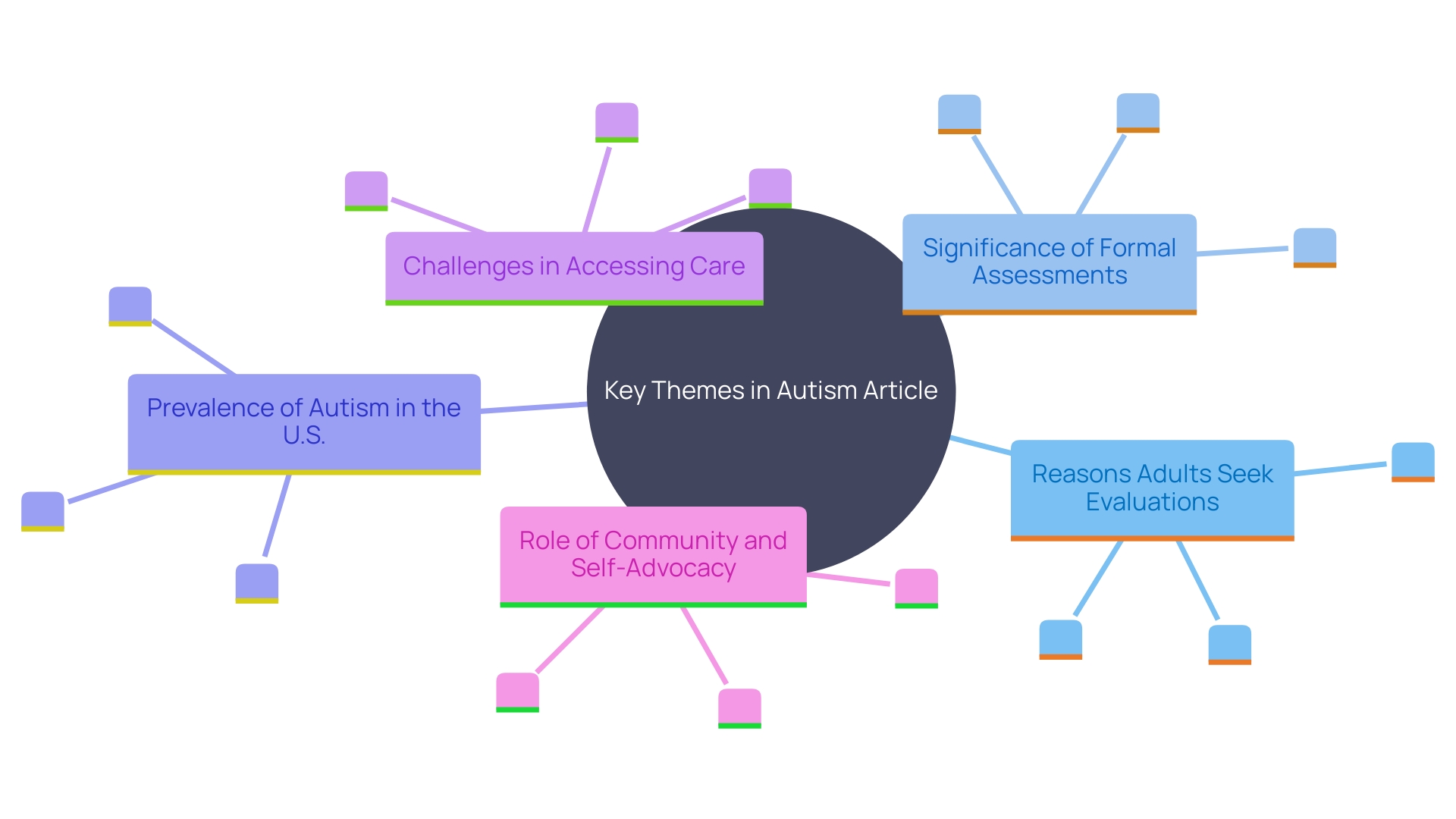
Finding a Professional for an Autism Evaluation
Locating a skilled expert for an adult evaluation of developmental disorders can be a difficult task that demands extensive research and thoughtful consideration. It's important to seek out mental health practitioners, psychologists, or psychiatrists who have specific experience in neurodevelopmental disorders and a strong reputation in the field.
The Diagnostic and Statistical Manual, Fifth Edition (DSM-5) of the American Psychiatric Association is the standardized guide used by clinicians to diagnose Autism Spectrum Disorder (ASD). While no single tool should be the sole basis for diagnosis, clinicians often rely on a combination of personal observations and detailed descriptions of the individual's developmental history.
Initiatives such as the Adult Autism Health Resources project by Harvard Medical School, backed by the Nancy Lurie Marks Family Foundation, emphasize the necessity for enhanced support and education for clinicians, caregivers, and self-advocates. This effort highlights the significance of tackling the current disparities in care for mature individuals with developmental disorders, as numerous grown-ups stay undiagnosed or were misidentified in their youth.
Resources such as professional directories, personal referrals, and online reviews can be valuable in identifying specialists who are knowledgeable in assessments for grown-ups with developmental disorders. 'Additionally, awareness and advocacy efforts, like those led by the Interagency Autism Coordinating Committee (IACC), aim to improve coordination and communication across the federal government and the community for individuals on the spectrum, enhancing the support available for these individuals and their families.'.
The Evaluation Process: What to Expect
The assessment procedure for a grown-up autism identification is thorough and complex. It generally begins with a series of interviews, questionnaires, and assessments that aim to gather a comprehensive understanding of the individual's developmental history, current challenges, and behavioral patterns. This approach frequently incorporates standardized criteria from the American Psychiatric Association's Diagnostic and Statistical Manual, Fifth Edition (DSM-5), which aids in ensuring consistent and precise assessments.
A detailed examination of the individual's developmental history is crucial. This might involve discussions about early childhood behaviors and any developmental milestones or delays. These conversations are often supplemented by self-report questionnaires that the individual fills out to provide insight into their current experiences and challenges.
Additionally, input from close family members or friends can be incredibly valuable. These individuals can offer unique perspectives on the person's behavior and development over time, contributing to a more rounded and thorough evaluation. This collaborative approach helps in painting a fuller picture of the individual's experiences and supports a more accurate diagnosis.
Despite the thoroughness of this process, finding specialists who are skilled in diagnosing grown-up developmental disorders can be challenging. The evaluations can be expensive and are not always included by insurance, and there is occasionally a lack of awareness among clinicians about the varied manifestations of the condition. Initiatives like the Autism Health Resources project by Harvard Medical School aim to address these gaps by educating clinicians and caregivers, ensuring that autistic individuals receive the quality care they need.
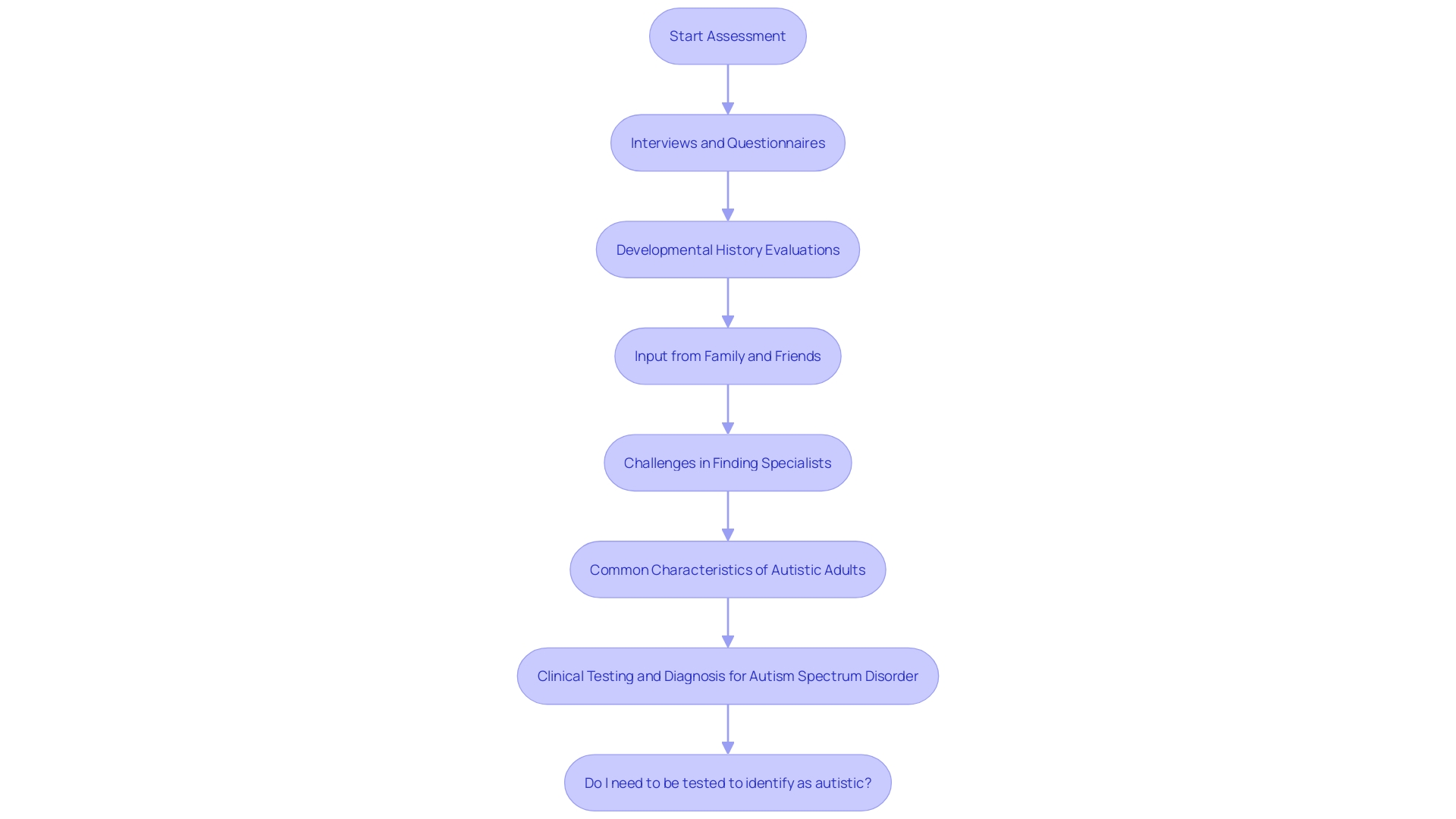
Diagnostic Tools and Assessments Used for Adults
During the evaluation process for grown-up developmental disorders diagnosis, professionals utilize a range of instruments and assessments to guarantee precision and comprehensive understanding of the individual's condition. Among the most commonly used standardized questionnaires are the Autism Diagnostic Observation Schedule (ADOS) and the Autism Diagnostic Interview-Revised (ADI-R). These instruments are designed to evaluate key areas such as social communication, restrictive behaviors, and sensory sensitivities, which are characteristic of the condition.
The accuracy of these tools was highlighted in a study involving 839 adults, which revealed that the RAADS-R and RAADS-14 surveys were effective across different demographics. The study included participants who were diagnosed with autism, self-identified as autistic, were unsure, or did not consider themselves autistic. Results suggested that age, gender, and medical condition did not influence how participants interpreted the survey, highlighting the dependability of these instruments.
Furthermore, early detection and intervention have been demonstrated to greatly enhance results, rendering the precision of these diagnostic tools essential. According to the Centers for Disease Control and Prevention, nearly 3% of children in the United States are diagnosed with a developmental disorder, emphasizing the growing need for reliable screening methods. Organizations like The Autism Community in Action (TACA) are actively working to bridge gaps in diagnostic technologies, aiming to provide timely and accurate diagnoses to support better long-term outcomes.
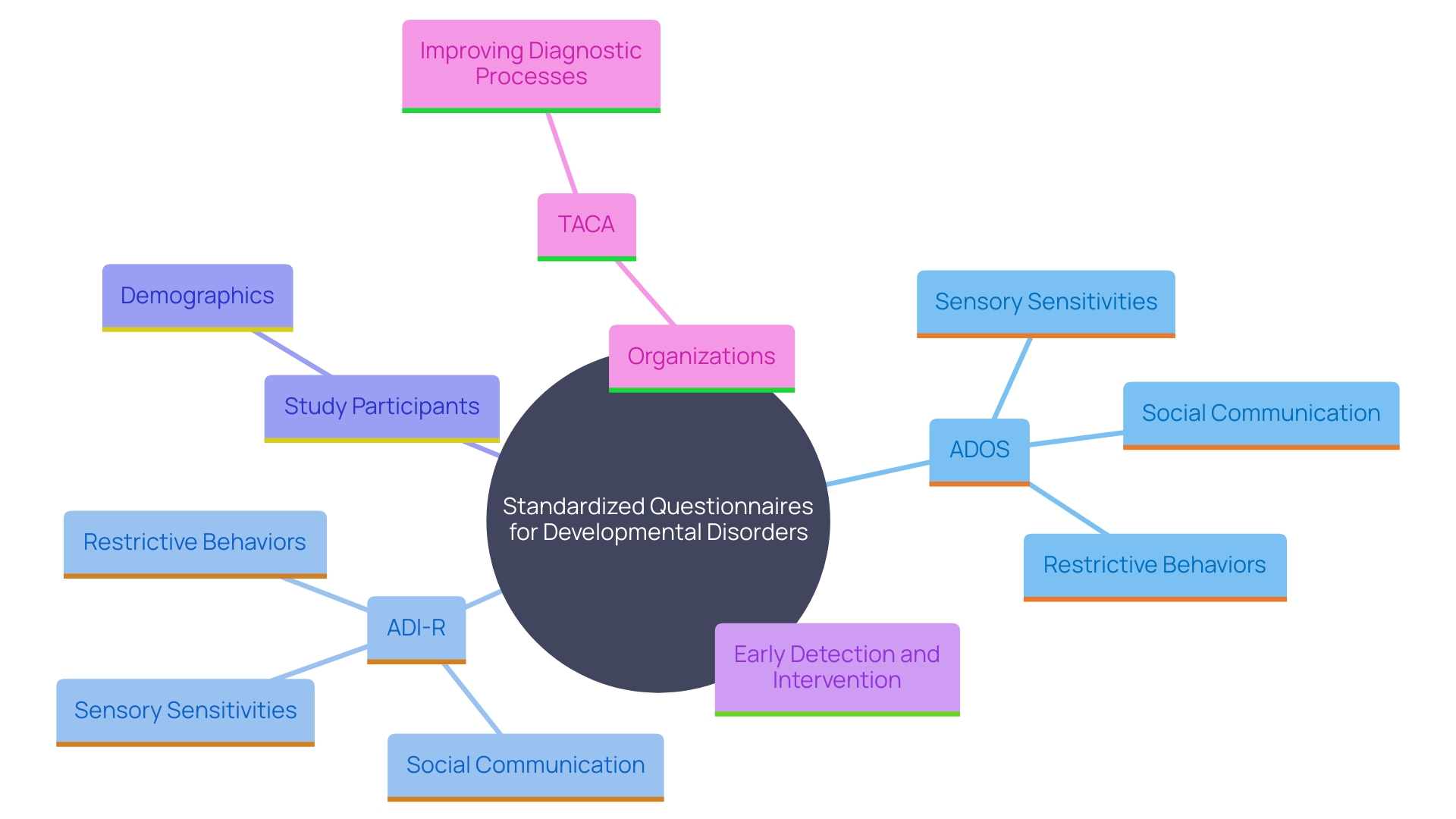
Preparing for an Autism Evaluation
Getting ready for an assessment involves collecting a thorough personal background, considering particular behaviors, and talking about any worries with relatives or acquaintances. It's beneficial to jot down particular questions or topics to address during the assessment. This preparation can lead to a more productive and insightful evaluation, helping to pinpoint specific areas that might need attention. Identifying a spectrum condition typically depends on a mixture of self-reports or family accounts of developmental history and expert observations. The American Psychiatric Association's Diagnostic and Statistical Manual, Fifth Edition (DSM-5) provides standardized criteria to assist in identification, ensuring a thorough and consistent approach. Utilizing this structured method, combined with detailed personal preparation, can significantly enhance the accuracy and effectiveness of the assessment process.
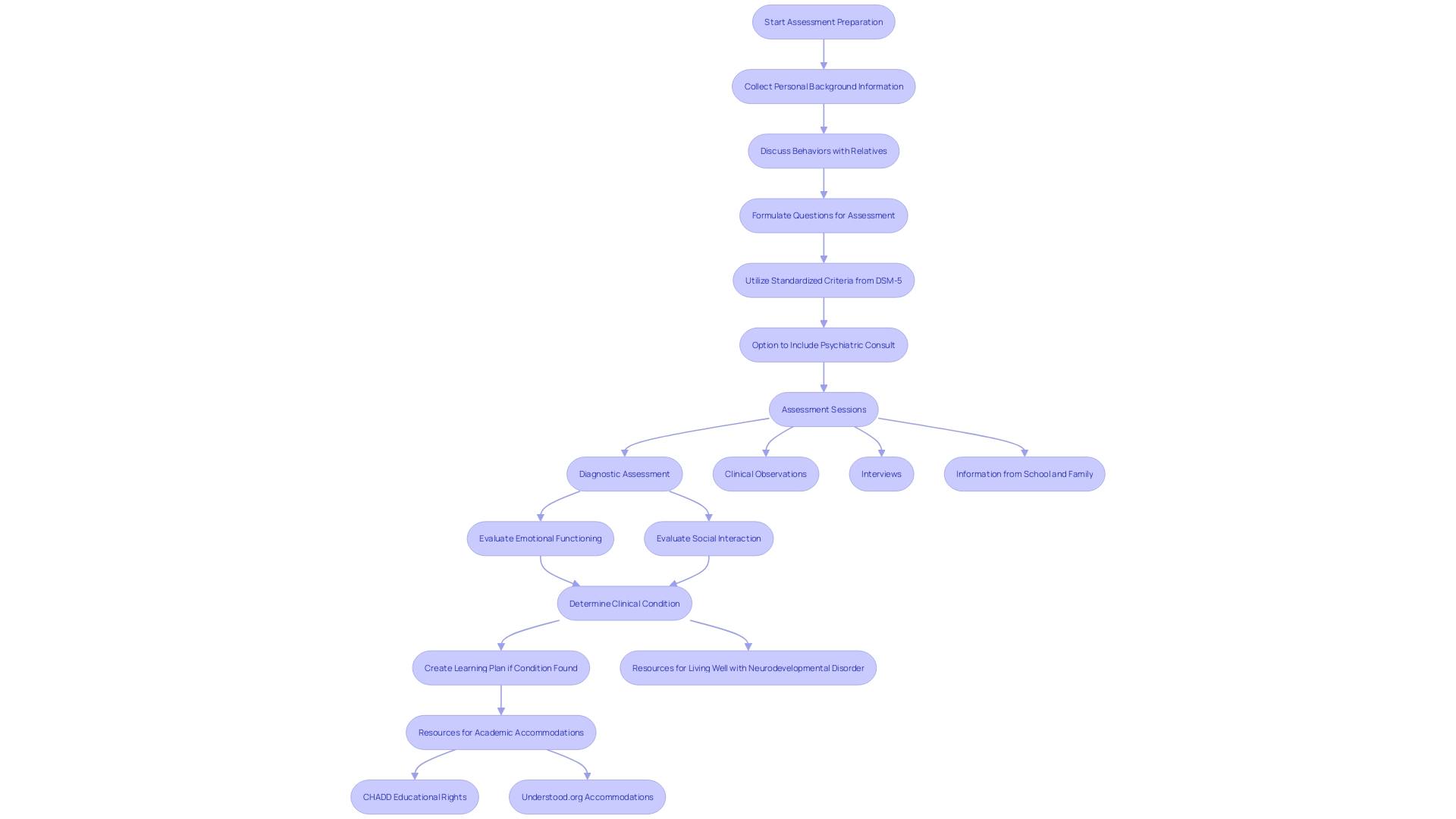
Benefits of Getting an Adult Autism Diagnosis
Obtaining an autism diagnosis as a mature individual can be transformative, unlocking various benefits that significantly impact one's life. Autistic adults currently face the lowest employment rate among people with disabilities, with only 58% employed. This lack of employment can lead to reduced access to healthcare and other vital benefits typically provided by employers. Furthermore, individuals lacking assistance are at risk of unemployment, underemployment, financial vulnerability, homelessness, and a shortened lifespan.
An accurate assessment can facilitate access to supportive services such as occupational, behavioral, and speech therapies, which are now covered by Medicaid and private insurance. These services are essential for fostering independence, securing employment, and participating fully in the community. The U.S. Department of Health and Human Services' 2022 Report to Congress highlights the disparities in service access among various communities, emphasizing the need for equitable support.
Furthermore, an assessment can assist individuals in linking with the autism community, offering a sense of belonging and common experience. This connection is vital, particularly as many autistic individuals encounter long waitlists for diagnosis and services, averaging two years each. The delay is even longer for marginalized groups, further exacerbating the challenges they face.
Dr. Matt Mosconi of the Kansas Center for Autism Research and Training observes that an increasing number of individuals are receiving diagnoses after being misdiagnosed or not assessed during their childhood. Despite increased awareness and resources, finding healthcare providers who can offer appropriate support remains challenging. The Centers for Disease Control and Prevention estimates that 1 in 45 individuals in the U.S. has a spectrum condition, underscoring the need for competent, coordinated care across medical specialties.
In summary, receiving a grown-up evaluation opens doors to essential services and a supportive community, helping individuals lead more fulfilling lives and navigate the challenges they face.
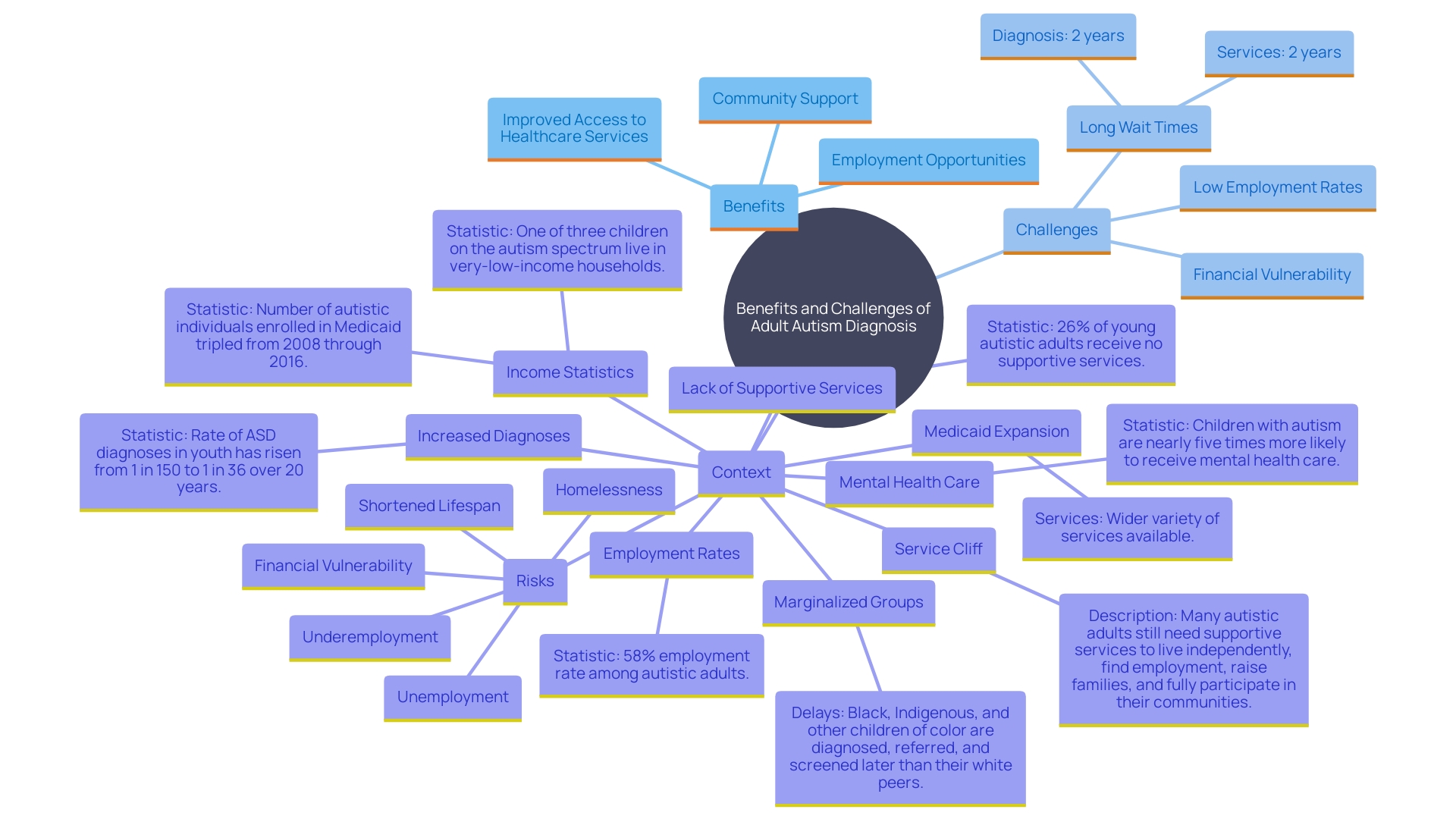
Common Challenges in Adult Autism Diagnosis
Receiving a diagnosis for individuals with developmental disorders frequently faces numerous challenges, mainly arising from insufficient knowledge among healthcare professionals regarding how these conditions manifest in grown individuals. This gap in understanding can result in misdiagnoses or delays in recognizing the condition, as many clinicians are more accustomed to pediatric cases and may overlook the subtle symptoms in older individuals. Furthermore, grown individuals may have difficulty with self-advocacy or fail to acknowledge their characteristics as signs of a developmental disorder, which delays assessment and essential assistance.
Dr. Matt Mosconi, director of the Kansas Center for Autism Research and Training, emphasizes that many individuals receive a diagnosis of this condition later in life after being misdiagnosed or not assessed during their early years. This issue is compounded by the fact that the diagnostic criteria for developmental disorders have evolved over the years, leading to gaps in knowledge among some healthcare providers. Consequently, grown individuals may go for years without realizing that their difficulties with social interaction and repetitive actions are connected to the condition.
Data from the Centers for Disease Control and Prevention (CDC) show that around 1 in 45 individuals in the U.S. has a developmental disorder related to the autism spectrum (ASD). Despite this significant number, the healthcare system is still not fully equipped to cater to the unique needs of autistic adults. Numerous services and assistance accessible to children with developmental disorders do not carry over into adulthood, resulting in a significant void in care.
The Adult Autism Health Resources initiative, launched by Harvard Medical School with assistance from the Nancy Lurie Marks Family Foundation, aims to address these gaps. The initiative focuses on educating clinicians, caregivers, and self-advocates to bring meaningful change across healthcare systems. Christopher McDougle, faculty director of the initiative, explains that while society is more aware of developmental disorders in children, there is a pressing need to recognize and support individuals on the spectrum, who often lose access to services after high school.
Enhancing awareness and education for healthcare providers can significantly improve the diagnostic process for individuals. By promoting a better understanding of mature neurodevelopmental conditions and encouraging self-advocacy, the healthcare system can become more inclusive, ensuring that autistic individuals receive the quality care they deserve.
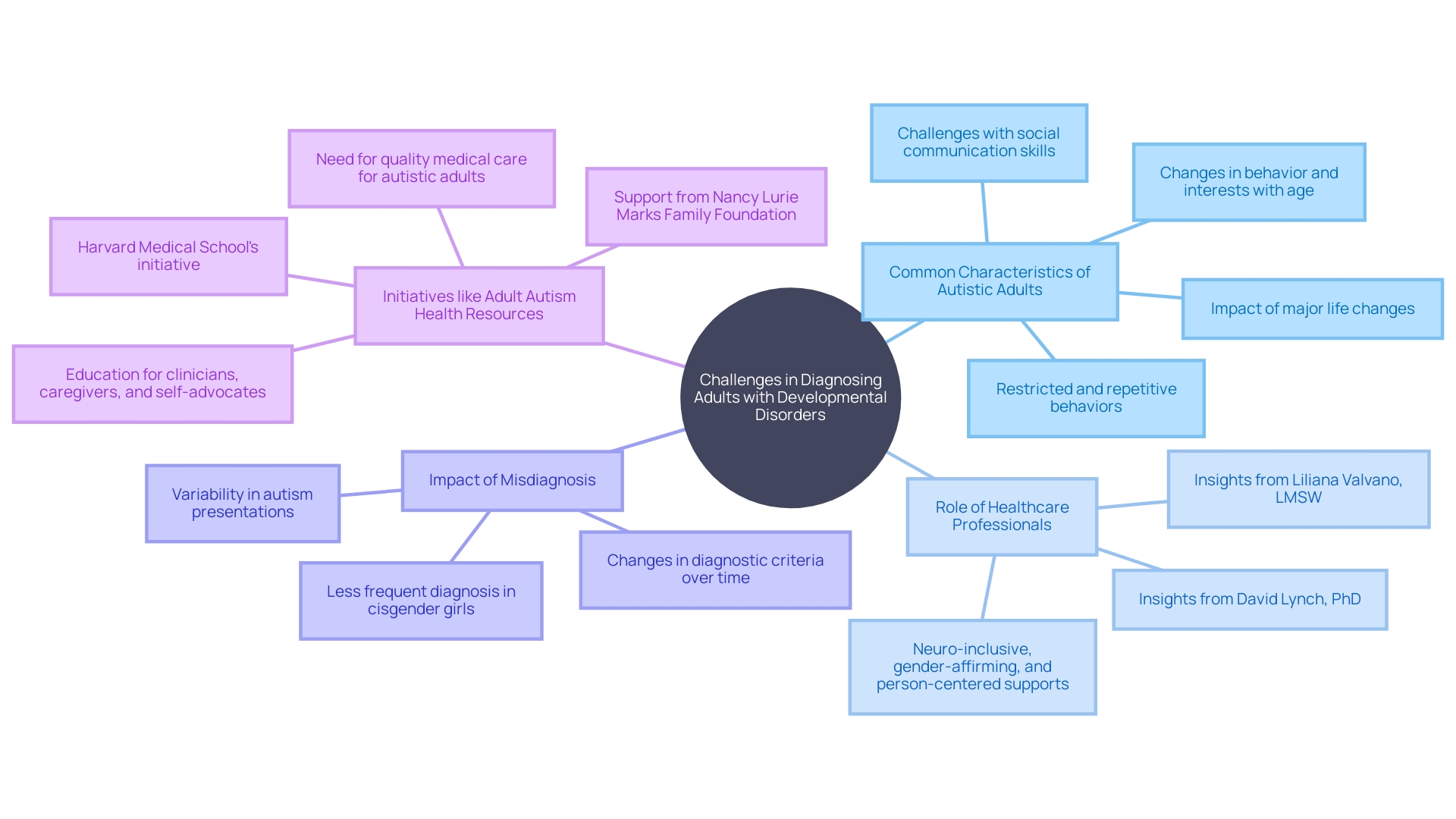
Understanding the Diagnostic Criteria for Adults
'The diagnostic standards for individuals, as outlined in the DSM-5, emphasize challenges in social interaction, limited interests, and repetitive actions.'. These criteria provide a structured framework to help individuals understand and assess their experiences. According to the Centers for Disease Control and Prevention, about 1 in 45 individuals in the U.S. have autism spectrum disorder (ASD). This highlights the importance of understanding these benchmarks in the evaluation process.
Dr. Neumeyer explains that a multipronged evaluation, including history, clinical interviews, observations, physical exams, and cognitive testing, is crucial for an accurate diagnosis. This comprehensive approach helps in identifying the nuanced symptoms that might have been overlooked or misdiagnosed as anxiety, ADHD, or learning disabilities in earlier years.
Christopher McDougle from Harvard Medical School emphasizes the need for competent, coordinated care for individuals with autism, pointing out that many lose access to essential services once they transition out of pediatric care. This gap in services highlights the significance of a comprehensive diagnostic process for individuals.
Real-life case studies further illustrate the diagnostic journey. One individual described their experience of undergoing testing, which included video conversations, medical history reviews, and behavior assessments. This process can vary greatly depending on the resources available and the specific needs of the individual.
In conclusion, grasping the DSM-5 standards and the thorough assessment procedure is crucial for individuals pursuing a neurodevelopmental condition identification. With 1 in 45 adults in the U.S. having ASD, it's crucial to navigate these benchmarks and obtain the necessary assistance.
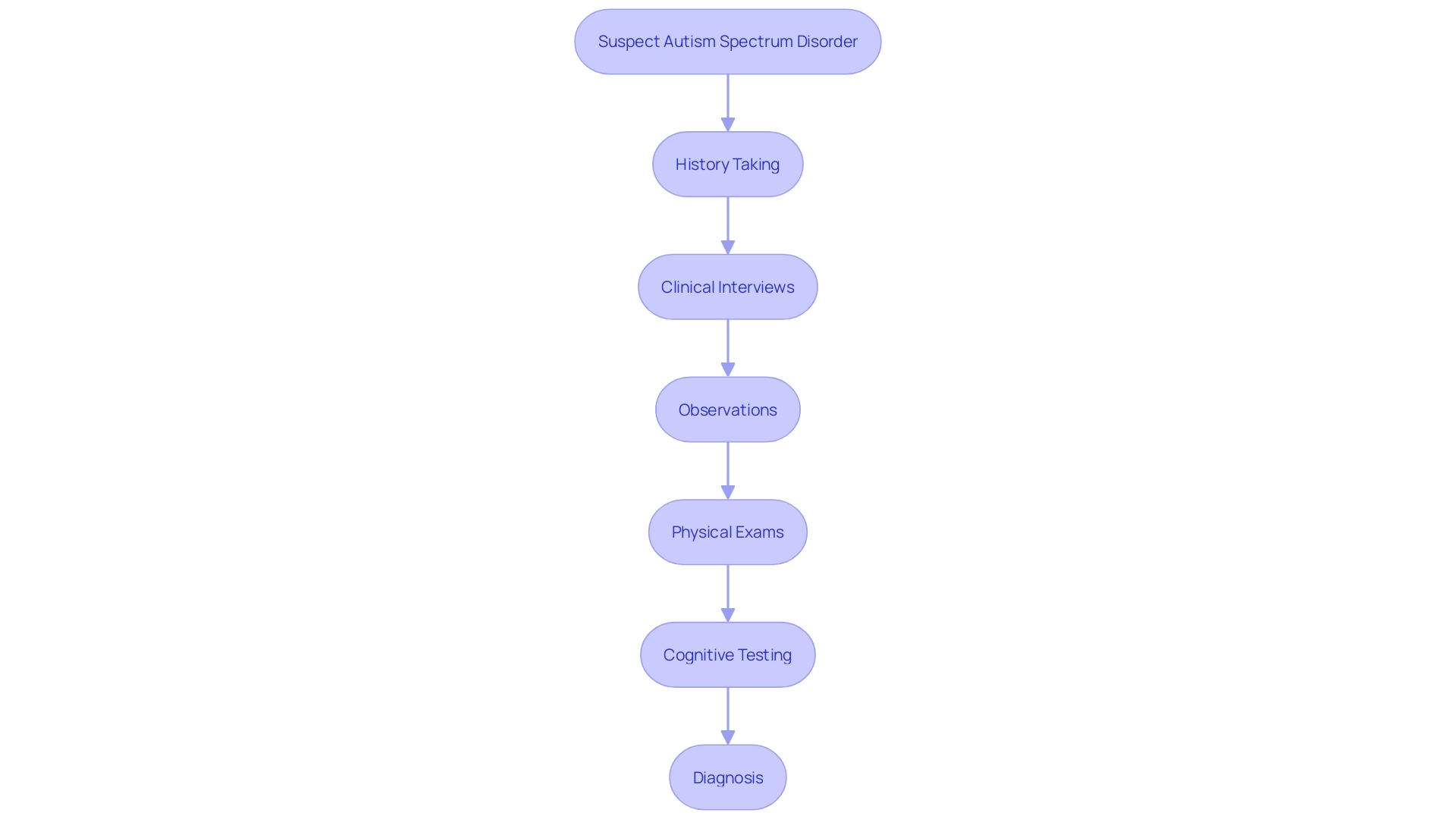
What Happens After the Evaluation
Following the assessment, individuals will obtain comprehensive feedback on whether they satisfy the requirements for a diagnosis related to a developmental disorder. If diagnosed, professionals will recommend personalized assistance strategies, therapies, and resources tailored to their needs. This phase is essential for personal growth and connecting with the community for individuals on the spectrum. 'Real-world examples emphasize the significance of varied assistance, as the experiences of autistic individuals and their families illustrate the need for diverse, individualized interventions.'. The IACC's strategic plan underscores the significance of addressing disparities and ensuring equity across diverse communities. Continuous research and updates on co-occurring conditions and personalized supports aim to improve the overall well-being of those on the autism spectrum.
Conclusion
Navigating the complexities of adulthood with undiagnosed autism can be a challenging experience, yet seeking an evaluation can provide transformative clarity and access to essential resources. As highlighted, the journey to understanding personal behaviors and struggles through a formal diagnosis not only validates lifelong experiences but also opens doors to tailored support systems crucial for thriving. With approximately 1 in 45 adults in the U.S. living with autism spectrum disorder, the urgency for competent care and support is paramount.
Finding the right professional for an evaluation is a critical step that requires careful consideration and research. The evaluation process itself is detailed and comprehensive, utilizing standardized tools and assessments to ensure accurate diagnoses. Preparing for this evaluation by reflecting on personal experiences and gathering relevant history can enhance its effectiveness.
The benefits of receiving a diagnosis extend beyond personal insight; they include improved access to services, a stronger sense of community, and the ability to engage with supportive networks.
Despite the challenges faced in the diagnostic process, including awareness gaps among healthcare providers and potential misdiagnoses, the importance of advocacy and education cannot be overstated. Initiatives aimed at enhancing the understanding of adult autism are essential for bridging the care gaps that many individuals encounter. Ultimately, the journey toward diagnosis and support is a vital step in empowering autistic adults to lead fulfilling lives, fostering independence, and ensuring equitable access to the resources they need.




